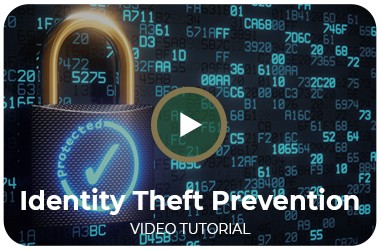Identity Theft Educational Video
To learn more about Identity Theft and how to protect yourself from it click on the video link below.
Identity Theft
What is Identity Theft? Identity Theft is a crime where a thief steals your personal information such as your full name and or social security number, to commit fraud. The thief can use your information to apply for credit, file taxes, get medical treatment or obtain other services. In other words, the thief uses your good credit to go on a spending spree.
To avoid being a victim consumers need to pay extra attention as they go about their daily routine. Below are tips to protect yourself against one of the fastest growing crimes in America.
Warning signs of Identity Theft: You get bills, credit card statements, calls from businesses or collection agencies, or other notices for debts and purchases you know nothing about.
Consumer's Best Defense
- Do not give Social Security numbers, credit card numbers, or other personal identifying information to anyone over the phone or in an email unless you are contacting them first. Legitimate financial institutions never call customers asking for account information. Do not respond to emails or phone calls that warn of dire consequences unless you take action immediately.
- Do not include your Social Security number on your checks and object if printed on student or work IDs that others can see. Do not carry your Social security card in your wallet.
- Protect your incoming and outgoing mail. Never leave outgoing mail in your mailbox or at your door. Instead deposit it in a blue United States Postal Service collection box or take it to the post office. Leaving the red flag up on your mailbox can alert thieves that there is something of value in the box.
- To deter thieves from going through your garbage, shred credit card slips, monthly bank statements, loan checks and credit card offers.
- Put your ATM, credit card receipts, and bank information in a safe place.
- Never leave your wallet unattended. Only carry with you the credit cards you plan to use.
- Closely review your credit card bills and bank statements. Report any unauthorized charges immediately.
- Carry only the credit and or ID cards that you actually use in your wallet. Try to limit yourself to only one or two credit cards, a debit card and a few personal checks.
- If you become aware of anyone using your identity immediately notify creditors, law enforcement and the major credit bureaus.
- Review your credit report at least once a year.
Young Adults at Risk
The 18-29 year old age bracket continues to be a target for Identity Theft. Unfortunately, young adults more typically think about protecting their personal belongings than their personal information. Young adults can help prevent themselves from becoming a target for identity theft with the following steps:
- There are many different ways that you could be scammed. The risk is not only with paper documents unprotected but also via email, social media and casual conversation.
- Purchase a cross-cut shredder so that you can immediately destroy documents that you no longer need or mail that is unsolicited.
- Do not share passwords or other personal information with roommates or friends.
- Keep your social security card in a locked safe place. Have a security box or rent a small safe deposit box from a local bank to keep your valuable and personal information.
- Do not post personal information on social media.
- Do not let someone borrow a driver's license or ID card. They could use it in many different ways that could hurt you.
- Do not loan a debit or credit card to a roommate or friend.
- Do not co-sign loans, cell phone applications, or utility accounts.
- If you have a credit card, you can check your credit report annually.
- Lock up. Lock your dorm, apartment or house. Lock your car doors. Put confidential documents in a locked, secure place.
Phishing
Phishing (FISH-ing) is a twist on an old telemarketing scam; however, instead of the phone, scam artists use email to target potential victims. It refers to how scam artists steal victims personal information. They are phishing for information. Scam artists pretend to represent a trusted source, like a bank, and then scare the customer with threats if they do not act quickly. These scammers steal credit card, bank account, and Social Security numbers. They also seek username and passwords or any other personal information. Phishing scams are constantly evolving and we offer the following tips so you don't become a victim:
- Never give out your personal financial information over the phone, in an email, through social media or on the Internet unless you contacted the other party first.
- Do not respond to an email that may warn of dire consequences. Always confirm these emails separately with the bank or company.
- Check your credit card and bank account statements regularly for unauthorized charges, even small ones. Report these discrepancies immediately.
- When submitting financial information on a website, look for the padlock or the key icon in your browser and make sure the address begins with "https". This is no guarantee for security, but the lack of these icons or "https" does indicate that the website is not secure.
- Report suspicious activity to the proper authorities immediately.
- If you do respond to a fraudulent email, contact your bank immediately so they can help protect your account and identity.
Fraud
Each year people are victimized by extremely persuasive and friendly thieves. Today, consumers not only have to deal with door-to-door scam artists, but hundreds of mail, email, social media and Internet scams. Here are some ways to prevent identity fraud from happening:
- Do not judge a book by its cover.
- Educate yourself first.
- Trust only professional, licensed brokers and sales agents.
- Do not trust "top-secret insider information" and "hot tips".
- Do not rush to invest or purchase after receiving a single phone call, attending a single seminar, or meeting with the salesperson a single time.
- Always question "secret" investment opportunities.
- Research every investment opportunity.
- Take extra precautions when presented with an overseas investment opportunity.
- Steer clear of opportunities that claim to be tax-free investments.
- When you make an investment, make the check payable to a company, never an individual salesperson.
- Examine all information and reports that you are provided.
- Ask questions of your adviser, agent, or sales person. Get answers.
- Do not sign up for or buy anything that you do not understand. Have a lawyer review any contracts you are asked to sign.
- Be wary of very quick returns on an investment.



